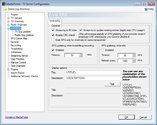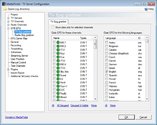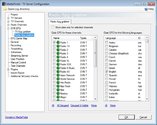Hello
I've had a quick peruse of the above conversation and I too have the same problem.
I use a Windows 7 pc that is as up to date as I can make it. It has 32 Gb of memory in it. I run little else on it apart from MediaPortal 1.25.
This problem is definitely in version 1.21 and I believe it is also in version 1.19 when I started to narrow down the problem.
Last night I started and stopped the TV service from the TV Server configuration program because starting and stopping the TV Service is the only way I have discovered to minimise the problem of MediaPortal locking up. No programs were scheduled to be recorded and I do not use MediaPortal to play back recordings. This morning MediaPortal had locked up. Checking the memory usage of the TVService*32.exe showed approximately 1.6 GB Peak Working Set Memory and a little less for the Private Working set. There was no CPU usage on the TVService*32.exe. I tried to start and stop the TVService but was unable to. I tried to use the Task Manager to End the Process Tree, but was not able to. I tried to shutdown the PC and that failed too. Eventually I had to pull the plug.
So thats some background to the problems I have with MediaPortal. My past investigations led me to posts previously about the same subject. From what I read the problem appears to be due to scheduling recordings but only a specific type of schedued recording. When you schedule a recording via 'Advanced Record' and then select 'Record every time on EVERY channel' it starts to cause the problems. I had quite a few such scheduled recordings (approximately 10) and MediaPortal would lock up frequently. When I reduced the scheduled recordings for every channel to a more meagre 4 the lockups occur approximately once a day unless I start and stop the TVService.
So may I suggest the following test:-
Start and stop the TVservice.
Put a whole load of scheduled recordings in for programmes with the 'every time on EVERY channel'. The more set up to record the quicker the problem will manifest itself.
Then keep an eye on the memory usage in Task Manager.
I think you will find that the memory can then be seen to keep on climbing at a rate proportional to the number of said scheduled recordings.
The problem might also be proportional to the number of available channels on the transmitter being recorded from.
So that's the proposed test. Whats the cause ? I speculate that its due to a basic problem of a memory leak on the schedule a recording. Its too tiny a memory leak for it to be noticed when using 'Record once' or 'Record every time on this channel' but because 'Record every time on EVERY CHANNEL' simply magnifies the tiny memory leak problem to a noticeable one and having too many of such scheduled recordings causes it to be a major problem causing MediaPortal to lock and for the operating system to be unable to gracefully shutdown without pulling the plug.
I find the 'Record every time on every Channel' to be a very useful feature and I really would like this problem to be solved and not solved by simply removing the feature.
I'd like to help, but because I use Windows 7 I do not connect it to the Internet and I find that the current system of having to have a connection to the internet to perform an update very irritating because while my PC is connected to the Net it is vulnerable.
I hope my above thoughts are helpful and help lead to a fix of this extremely irritating problem.
Finally my thanks to everyone involved in creating MediaPortal!
I've had a quick peruse of the above conversation and I too have the same problem.
I use a Windows 7 pc that is as up to date as I can make it. It has 32 Gb of memory in it. I run little else on it apart from MediaPortal 1.25.
This problem is definitely in version 1.21 and I believe it is also in version 1.19 when I started to narrow down the problem.
Last night I started and stopped the TV service from the TV Server configuration program because starting and stopping the TV Service is the only way I have discovered to minimise the problem of MediaPortal locking up. No programs were scheduled to be recorded and I do not use MediaPortal to play back recordings. This morning MediaPortal had locked up. Checking the memory usage of the TVService*32.exe showed approximately 1.6 GB Peak Working Set Memory and a little less for the Private Working set. There was no CPU usage on the TVService*32.exe. I tried to start and stop the TVService but was unable to. I tried to use the Task Manager to End the Process Tree, but was not able to. I tried to shutdown the PC and that failed too. Eventually I had to pull the plug.
So thats some background to the problems I have with MediaPortal. My past investigations led me to posts previously about the same subject. From what I read the problem appears to be due to scheduling recordings but only a specific type of schedued recording. When you schedule a recording via 'Advanced Record' and then select 'Record every time on EVERY channel' it starts to cause the problems. I had quite a few such scheduled recordings (approximately 10) and MediaPortal would lock up frequently. When I reduced the scheduled recordings for every channel to a more meagre 4 the lockups occur approximately once a day unless I start and stop the TVService.
So may I suggest the following test:-
Start and stop the TVservice.
Put a whole load of scheduled recordings in for programmes with the 'every time on EVERY channel'. The more set up to record the quicker the problem will manifest itself.
Then keep an eye on the memory usage in Task Manager.
I think you will find that the memory can then be seen to keep on climbing at a rate proportional to the number of said scheduled recordings.
The problem might also be proportional to the number of available channels on the transmitter being recorded from.
So that's the proposed test. Whats the cause ? I speculate that its due to a basic problem of a memory leak on the schedule a recording. Its too tiny a memory leak for it to be noticed when using 'Record once' or 'Record every time on this channel' but because 'Record every time on EVERY CHANNEL' simply magnifies the tiny memory leak problem to a noticeable one and having too many of such scheduled recordings causes it to be a major problem causing MediaPortal to lock and for the operating system to be unable to gracefully shutdown without pulling the plug.
I find the 'Record every time on every Channel' to be a very useful feature and I really would like this problem to be solved and not solved by simply removing the feature.
I'd like to help, but because I use Windows 7 I do not connect it to the Internet and I find that the current system of having to have a connection to the internet to perform an update very irritating because while my PC is connected to the Net it is vulnerable.
I hope my above thoughts are helpful and help lead to a fix of this extremely irritating problem.
Finally my thanks to everyone involved in creating MediaPortal!

 United Kingdom
United Kingdom


